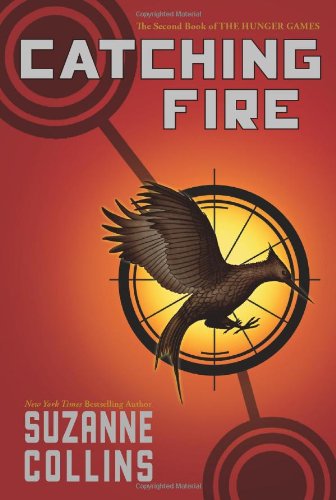All Nonfiction
- Bullying
- Books
- Academic
- Author Interviews
- Celebrity interviews
- College Articles
- College Essays
- Educator of the Year
- Heroes
- Interviews
- Memoir
- Personal Experience
- Sports
- Travel & Culture
All Opinions
- Bullying
- Current Events / Politics
- Discrimination
- Drugs / Alcohol / Smoking
- Entertainment / Celebrities
- Environment
- Love / Relationships
- Movies / Music / TV
- Pop Culture / Trends
- School / College
- Social Issues / Civics
- Spirituality / Religion
- Sports / Hobbies
All Hot Topics
- Bullying
- Community Service
- Environment
- Health
- Letters to the Editor
- Pride & Prejudice
- What Matters
- Back
Summer Guide
- Program Links
- Program Reviews
- Back
College Guide
- College Links
- College Reviews
- College Essays
- College Articles
- Back
Hunger Games: Catching Fire by Suzanne Collins
Catching Fire, the second book in The Hunger Games trilogy, provides a great follow-up for the abrupt ending of the first novel. Suzanne Collins does an exemplary job of providing just enough information to keep the reader constantly guessing, yet also indulged in each of the characters personal battles. All of the character’s stories are expertly intertwined, and each of the characters are realistic and relatable to readers of any age or background.
Although the setting of this story takes place in a post-war futuristic North America, many aspects of their totalitarian government are similar to many controversies in today’s world. This fictional novel connects the over-exaggerated world of Panem with the real world by presenting relatable themes such as ignorance, government vs citizen, rebellion, and love.
Suzanne Collins effectively uses a large amount of symbolism throughout the entire trilogy. Although, sometimes, it might require extra analyzation, every detail is intentional and symbolic. Even the names of the characters have a deeper meaning whether it’s Katniss, named after a tall flower with arrowhead shaped leaves, or president Snow, an ironic name meaning purity and innocence.
Catching Fire expands upon the stories of the existing main characters in the first novel The Hunger Games, as well as introducing an entire new set of lovable and believable people. At every turn of the page you will become more invested in the personal lives of these fictional yet realistic characters. This book is highly recommended for all audiences, it incorporates practical themes with fictional surroundings as well as a simplistic writing style and fast pace that you will surely not be able to put it down.
Similar Articles
JOIN THE DISCUSSION
This article has 0 comments.

